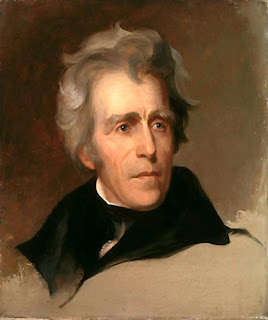Even though Jefferson fought very hard to have George Washington stop listening to Hamilton, he was not successful. As a result Washington created the First Bank of the US. In 1791 a 20 year charter was passed, and the currency issuing power of the US was given to the central bank. Jefferson lamented the actions his countrymen had taken, and said, “I wish it were possible to obtain a single amendment to our Constitution taking from the federal government their power of borrowing.”
Although Jefferson lost this battle against the bankers, he still had more opportunities to halt their agenda when he was elected third President of the US in 1800. During Jefferson's second term Napoleon started his European military campaign. What most people don't know is that Napoleon sought to rid Europe of bankers. He thought that when a government is dependent on bankers for money, the banks, not the government, are in control. This can be seen when he said, “The hand that gives is above the hand that takes. Money has no motherland; financiers are without patriotism and without decency: their sole object is gain.” Jefferson made a deal with Napoleon called the Louisiana Purchase, which helped fund Napoleon's fight against the bankers.
The man who was elected Vice President in 1800 was James Madison, a very good friend of Jefferson's. Madison also shared the same views about central banking as Jefferson, and Madison was able to do some good against the banks as the fourth president. During Madison's first term the charter for the First Bank of the United States was set to expire. A vote to extend the charter was called for in the House, where it was defeated, and also in the Senate, where votes in favor of and against the bank were tied. Of course in this situation the Vice President decides if the bill passes or fails in the Senate, and since George Clinton held the same views on central banking as Madison the First Bank of the United States was sent into oblivion in 1811.
However, the international bankers who benefited from the First Bank were eventually able to create the Second Bank of the United States in 1816 because of the rough financial position the country was in from the war of 1812. One third of the Second Bank of the United States was owned by foreign investors, mainly European. The Second Bank received a 20 year charter just like the First Bank, but a vote to extend the charter of the Second Bank was put through congress four years earlier than the charter was set to expire. The President in 1932 was Andrew Jackson.
Old Hickory was Jackson's nickname, because of his strength under times of great stress. He was a decorated military veteran, and the last President to have also been a veteran of the Revolutionary War. He joined the Colonial Militia when he was 13, where he served as a courier with his brother. Soon after joining, the two were captured by the British. Beaten, starving, and infected with smallpox, Jackson developed a strong hate for his enemies, and a fighting spirit which would be reflected by his time in office.
 |
| Andrew Jackson |
It is not our own citizens only who are to receive the bounty of our Government. More than eight millions of the stock of this bank are held by foreigners... Is there no danger to our liberty and independence in a bank that in its nature has so little to bind it to our country? Controlling our currency, receiving our public moneys, and holding thousands of our citizens in dependence... would be more formidable and dangerous than a military power of the enemy. If [government] would confine itself to equal protection, and, as Heaven does its rains, shower its favor alike on the high and the low, the rich and the poor, it would be an unqualified blessing. In the act before me there seems to be a wide and unnecessary departure from these just principles.The bill of course went back to Congress to be voted on again. During this time the President of the Second Bank of the United States, Nicholas Biddle, released a few statements saying, "This worthy President thinks that because he has scalped Indians and imprisoned judges, he is to have his way with the Bank. He is mistaken." Biddle later said, "Nothing but widespread suffering will produce any effect on Congress... Our only safety is in pursuing a steady course of firm restriction – and I have no doubt that such a course will ultimately lead to restoration of the currency and the recharter of the bank."
After this statement was published an economic depression ensued which seemed to be the fault of President Jackson's direct monetary actions. However, many members of Congress did some research and discovered that it was not Jackson's fault, but was most likely caused by the Second Bank. The bill to extend the charter of the Second Bank did not pass, and a congressional committee was set up to investigate whether or not the Second Bank's actions caused the depression. When Nicholas Biddle was shown a subpoena to produce financial statements, he refused to cooperate. A year later Biddle was arrested and charged with fraud.
During this investigation, Jackson had the Treasury remove all funds from the central bank, and the last dollar was withdrawn on January 8th, 1835. Twenty two days later there was an assassination attempt on Jackson by a man named Richard Lawrence. Many people, including Jackson himself, believed that Richard Lawrence was hired to kill the President by North American and European central bankers in retaliation for Jackson ending the bank.
When asked what his most important accomplishment during his presidency was, Jackson replied, "I killed the bank." He was so very proud of this accomplishment that he had those very words put on his tombstone.
No comments:
Post a Comment